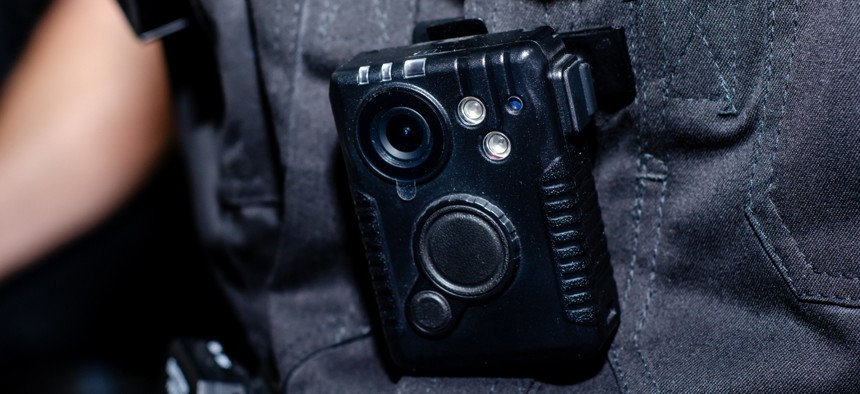All Veterans Affairs police officers to be issued bodycams, dashcams by end of 2023

artas/Getty Images
The Department of Veterans Affairs said it will begin issuing in-car and body-worn cameras on June 20, starting with officers at the VA Desert Pacific Healthcare Network in Long Beach, California.
The Department of Veterans Affairs announced on Friday that all of the agency’s police officers will be required to use “in-car and body-worn cameras,” with the new policy beginning to take effect on Tuesday.
VA said in a press release that the cameras “will automatically record video and audio when an officer draws their issued firearm from their duty belt holster or when an officer activates the emergency lights in their police vehicle.”
“Officers will also manually turn on their [body-worn cameras] when conducting investigations and during enforcement encounters,” VA added. “In-car cameras will be turned on for traffic stops, while responding to calls for service and while transporting those in custody.”
The department said that all of its approximately 4,670 police officers — who serve at VA medical centers, facilities and other agency-run sites — will be equipped with dashcams and bodycams by the end of 2023, with officers at the VA Desert Pacific Healthcare Network in Long Beach, California, receiving their cameras on June 20.
“By outfitting every VA police officer with a body-worn camera, we’re enhancing transparency and ensuring safety and accountability in policing,” Veterans Health Administration Senior Security Officer Troy Brown said in a statement.
VA police have used their weapons in the line of duty on multiple occasions, including a January 2020 incident in which officers shot and killed a veteran who brandished a knife after seeking help for mental health issues at the Dallas VA Medical Center.
The department said it has taken steps “to ensure that the use of these cameras does not infringe upon the privacy of those we serve or VA employees,” including having VA police officers and privacy officers undergo extensive training in preparation of the new policy’s implementation.
In a list of frequently asked questions on its VA police website, the department also said that recordings will be uploaded “to a cloud-based digital evidence locker,” where it can manage and maintain chain-of-custody. The length of time it will hold on to footage will “depend on how any given incident is classified.” VA said it might keep some material for up to 25 years but could discard footage from an "incidental or false activation" after just 30 days.
“Using dashcams and bodycams will make our facilities even safer — building trust in our great police force while increasing transparency and promoting de-escalation,” VA Secretary Dennis McDonough said in a statement.
VA said it implemented the new policy in response to President Joe Biden’s May 2022 executive order on accountable policing and criminal justice practices, as well as last year’s Cleland-Dole Act that directed the department to “implement a policy requiring VA police officers to wear body cameras that record and store audio and video.”
The Department of Homeland Security announced its own departmentwide body camera policy last month for all nine of its operational law enforcement agencies, a move that also came in response to Biden’s executive order.



